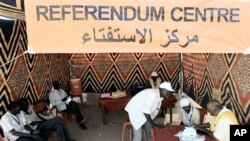South Sudan is preparing to hold a referendum on January 9 that could see the region split from Sudan's Arab-dominated government in Khartoum. On the same day, a similar referendum is supposed to take place in the Sudanese region of Abyei, but who gets to vote in that referendum is in dispute.
Dozens of trucks and buses have begun arriving in Abyei town, arranged by local authorities to bring back tens of thousands of people who were driven out by Sudan's two decade-long war.
Kuol Athieng Liem recently came back to Abyei after having spent years in exile in the north. He is now helping register returnees, who are expected to number more than 36,000 by the end of next month.
He says the journey takes days, traveling over bad roads, and there are so many people jammed into each bus, it is not a pleasant journey for anyone. But, he says, no one minds the hardship because the people are finally coming home.
The vast majority of the returnees are Ngok Dinka, a tribe of farmers and herders who regard Abyei as their traditional homeland.
Their leader, Paramount Chief Kuol Deng Kuol, says every returning Ngok Dinka need to be quickly re-settled because the Comprehensive Peace Agreement, which formerly ended the war in 2005, gives Abyei residents the right to decide in January on which side of the North-South divide they want to live.
Chief Kuol Deng says there is no question which side the Ngok Dinka will choose.
"Abyei is for the South and we are Dinka, as southerners," he said. "There are some people who want to annex Abyei to the North. We don't know why, against the people's wish. They are saying now they want to occupy the land because they are saying this is their land."
For generations, the Ngok Dinka have allowed thousands of Misseriya Humr nomads from the north to bring their cattle down to Abyei to graze during the dry season. Fearing they could lose these pastures if Abyei secedes along with the South, Misseriya leaders, backed by the government in Khartoum, have threatened war if their people are not allowed to vote in the referendum.
Abyei's chief administrator, Deng Arop Kuol, says the Ngok Dinka will not accept any deal that gives Misseriya nomads the right to vote. He says Khartoum is stirring up the Misseriya people in an effort to destabilize the region and to keep Abyei firmly under its control.
"The reason why Khartoum is intransigent, not to implement all the agreements they have signed on to and committed itself is simply because of oil," he said. "The area is said to be rich in oil and even where we are sitting now, we are sitting on oil. We say the Misseriya are not the ones causing problems, but that it is the government that is pushing them."
In the town's central market, Arab shopkeepers watch nervously for any sign of increased hostility from Abyei's Ngok Dinka residents. Ali Hajj Ahmed, a Misseriya born and raised in Abyei, says tension is high.
He says he wants to ask the politicians in both Khartoum and Juba to give the residents of Abyei, whether Misseriya or Ngok, a chance to sit down and solve this problem by themselves. "Any time you inject politics into these types of situations, all you get is trouble," he says.
The United Nations Mission in Sudan, known as UNMIS, declined to comment about the rising tension in Abyei. But with only about 700 peacekeepers posted in Abyei, U.N. officials are said to be concerned about reports of militias being armed by the North and South - and increased military presence on both sides that could make any conflict here potentially deadly.
U.N. aid agencies and non-governmental organizations are quietly mobilizing to respond to emergencies. The U.N.'s World Food Program began operations here in 2008, after northern forces burned down half of Abyei and displaced more than 50,000 people.
WFP says its priority is to help local residents become more self-sufficient. But it is poised to assist if a new crisis occurs.
Margherita Coco, the head of the local sub-office, says "At the moment, we are pre-positioning, basically putting food in strategic locations close to Abyei and within Abyei, about 1,600 metric tons of food in total that may feed a population of about 80 to 90,000 people for a month."
With no deal in sight and time running out, some returnees say they are keeping their bags packed, just in case.
